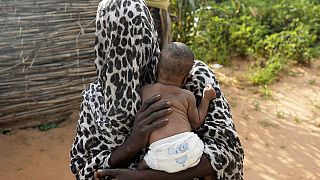Sudan
The cost of commodities and services has shot up in Sudan as fighting escalates in the country.
According to the United Nations humanitarian agency, the price of basic commodities such as fuel, food staples, and water has gone up by 60 percent or more due to supply challenges resulting from the clashes in Khartoum and other parts of Sudan.
This is a new setback to Sudan's stagnant economy. Shortages of main goods such as flour and vegetables have been reported in the capital along with unprecedented price hikes.
Khartoum is the business hub for most industries and services. Factories are located in parts of the city where intense fighting is happening. Some of them have been looted.
Sudan is an important exporter of gum Arabic, gold, sesame, peanuts, and livestock. But the economy has been held back by decades of sanctions and international isolation, as well as mismanagement and corruption.
People have been struggling with years of spiking inflation and sharp currency devaluations. The situation worsened after the 2021 military coup when international financial institutions halted Sudan's aid programs.
The ongoing conflict has closed out trade flows to and from Sudan and the main ports have halted operations until further notice.
The country's overwhelmed economy is expected to deteriorate further if the fighting continues.
Despite several ceasefires declared by Sudan's conflicting parties, tensions and some deadly fighting continue to rage in the capital Khartoum and other areas.
Sudan's health ministry stopped updating the number of casualties on May 2, when the death toll stood at 550 with 4,926 people injured.
In the meantime, hundreds of thousands of Sudanese are fleeing to neighboring countries. According to the United Nations High Commissioner for Refugees (UNHCR), a total of 123,110 refugees have fled to South Sudan, Egypt, Chad, Ethiopia, and the Central African Republic since the conflict erupted in mid-April.
The UN agency projected the number could rise to 860,000 in the next six months.












02:09
In a bid to aid its economy, Lebanon hopes to return to golden age of tourism
01:09
Egypt: Inflation forecast to have climbed further in May
01:08
OECD revises forecast, projects slowdown in global economic growth
01:11
US imposes sanctions on Sudan over chemical weapons use
11:15
Africa CEO Forum 2025: Nuclear, AI, and Infrastructure in focus [Business Africa]
Go to video
DRC: Belgian Foreign Minister meets Tshisekedi